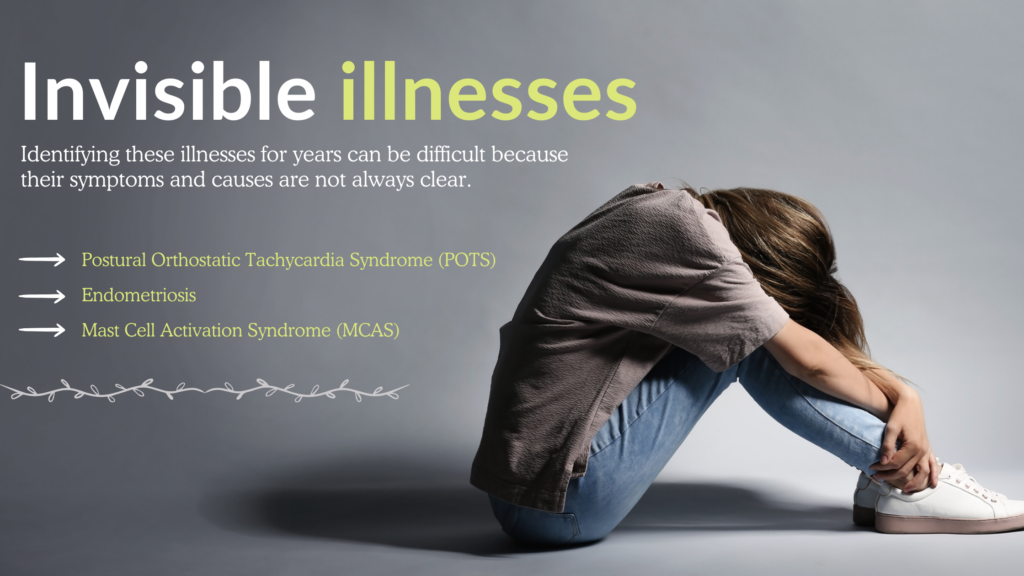Invisible Illnesses: Postural Orthostatic Tachycardia Syndrome (POTS), Endometriosis, and Mast Cell Activation Syndrome (MCAS)
Share
Invisible illnesses are often described as “hidden disabilities” because its symptoms are not obvious and often not apparent to others. Women have a higher probability of having these conditions, which include Postural Orthostatic Tachycardia Syndrome (POTS), Endometriosis, and Mast Cell Activation Syndrome (MCAS). They can be difficult to identify for years because their symptoms are often the same as those of other conditions and the causes are not always clear. Medical professionals often ignore or wrongly diagnose these illnesses, even though they cause serious physical and mental health problems.

Therefore, raising awareness and enhancing medical education is important. Women can receive the proper diagnosis and care without having to battle for years only if doctors have a better understanding of these disorders.
In this blog, we will discuss POTS, Endometriosis, and MCAS precisely along with the symptoms women face and their impact on daily life and mental health.
Postural Orthostatic Tachycardia Syndrome (POTS)
What is POTS?
POTS is a disorder of the autonomic nervous system that mainly impacts blood flow. A fast heart rate when standing up is a sign of this condition, which is often followed by dizziness, fainting, and extreme tiredness. According to research, about 80% of people with POTS are women, and most are diagnosed when they are in their teens or early 20s. It is a type of dysautonomia, and infections, pregnancy, or other underlying diseases can make it worse.
Symptoms and How They Affect Daily Life
Women with POTS experience a wide range of symptoms that affect their ability to function daily. These symptoms include:
Dizziness and Lightheadedness: When standing up, a lot of women feel dizzy, lost, or shaky. If it gets really bad, they might even pass out because their body can’t keep their blood pressure in control.
Rapid heartbeat (tachycardia): Heart rates can rise above 120 beats per minute in a matter of minutes, leaving people feeling weak, nervous, or as though their heart is beating uncontrollably.
Chronic fatigue: Even after sleeping for extended periods, women with POTS frequently struggle to get through the day. This extreme exhaustion might make it practically impossible to work, study, or take care of household duties, which can cause annoyance and loneliness.
Brain fog: A lot of women with POTS talk about having “brain fog,” which involves issues with focus, memory, and information processing. Social connections, academic achievement, and work performance can all be significantly impacted by this.
Gastrointestinal distress: POTS patients frequently have digestive problems such as bloating, nausea, and trouble breaking down meals. Some women may have pain and suffer from gastroparesis, a condition in which the stomach takes too long to empty food.
Why It Takes So Long to Get a Diagnosis
It is typically difficult to diagnose POTS because its symptoms are similar to those of anxiety disorders, chronic fatigue syndrome, and fibromyalgia. Most of the time, people have symptoms for several years before they get a correct diagnosis. Many women say that they were told their symptoms were “just anxiety” or “all in their head,” which put off getting the right help and made their mental health worse.
Impact on Mental Health
It is mentally challenging to live with Postural Orthostatic Tachycardia Syndrome, especially when you are young. Depression and anxiety can be brought on by a persistent dread of fainting, a loss of independence, and annoyance at being written off by medical professionals. Women frequently detach from friends and family because they feel misinterpreted and abandoned.
Endometriosis
What is Endometriosis?
Endometriosis is a condition that affects adolescents and reproductive-aged women. It is defined by the development of endometrial tissue in the exterior of the uterine cavity and is frequently connected with chronic pelvic pain and infertility.
According to the World Health Organisation, Endometriosis affects approximately 10% (190 million) of reproductive-age women worldwide. It is a chronic disease characterized by severe, life-altering pain during periods, sexual activity, bowel movements, and/or urine, persistent pelvic discomfort and pain beyond the monthly cycle, stomach bloating, nausea, exhaustion, anxiety, depression, and infertility.
Symptoms and How They Affect Daily Life
Endometriosis symptoms can be very painful and affect numerous aspects of a woman’s life.
Severe pelvic pain: Period cramps are normal, but endometriosis pain is much worse and can last longer than the regular menstrual cycle. Things like working out, going to work, and even doing simple things become challenging due to this.
Heavy menstrual bleeding: Excessive bleeding can result in anemia, which makes you weak and tired, leaky accidents, and numerous bathroom trips. This often makes it impossible for women to participate in social activities and leads them to skip work or school.
Pain during intimacy: Endometriosis can cause deep pelvic pain that can make intimacy painful or even unbearable. This can cause mental stress, anxiety, and trouble maintaining romantic relationships.
Infertility: In the worst cases, endometriosis leaves scars, adhesions, and tissue damage that makes it difficult or impossible to get pregnant. For women who have always wanted to have a family, this can be very upsetting.
Why It Takes So Long to Get a Diagnosis
It usually takes 7 to 10 years of having symptoms to be diagnosed with endometriosis. One of the causes for this delay is medical gaslighting and lack of concern about women’s quality of life. Sadly, there are still physicians who associate unbearable monthly periods with “normal menstrual cramps.”
Furthermore, because endometriosis symptoms overlap with diseases such as irritable bowel syndrome (IBS) and pelvic inflammatory disease (PID), women are frequently misdiagnosed before receiving an accurate diagnosis.
Endometriosis excision surgery is the gold standard for treating endometriosis, but many doctors are reluctant to diagnose and still use the outdated endo ablation method, which results in patients suffering for a long time.
Mental Health Impact
Women who have endometriosis frequently suffer from anxiety, despair, and sadness. It can be emotionally difficult to deal with infertility issues, chronic pain, and medical dismissal. Many endometriosis-affected women experience additional mental distress as a result of feeling guilty about their inability to fully engage in their personal and professional lives.
Mast Cell Activation Syndrome (MCAS)
What is MCAS?
MCAS is a disorder in which the immune system’s mast cells release too many chemicals, causing organ malfunction, inflammation, and severe allergic reactions. It is extremely challenging to diagnose since it affects several different bodily systems.
An estimated 17% of people are thought to have MCAS, however many cases are not identified since the medical establishment is unaware of the condition.
Symptoms and How They Affect Daily Life
MCAS symptoms vary widely but often include:
Allergic reactions that can’t be explained: Many women with MCAS have rapid allergic reactions that they can’t explain, like hives, swelling, and even life-threatening anaphylaxis. This makes venturing out with friends, eating out, or even just being in new places stressful and dangerous.
Severe digestive issues: Constant sickness, bloating, and diarrhea can make it hard to eat, which can cause you to lose weight and not get enough nutrients. People often mistake these symptoms for irritable bowel syndrome (IBS), which delays getting the right treatment.
Chronic fatigue: Even minor tasks can feel overwhelming when one is so exhausted that it becomes difficult to manage daily responsibilities, go to school, or maintain a job. Many women find it difficult to be productive and have busy lives.
Skin rashes and hives: Unexpected spikes in itching, redness, or painful welts can happen at any time, making it difficult to forecast what will trigger a reaction. These skin conditions can be upsetting emotionally as well as physiologically.
Mood swings, headaches, and brain fog: It might be challenging for many women with MCAS to concentrate at work or school due to attention issues, memory problems, and excruciating headaches.
Why It Takes So Long to Get a Diagnosis
MCAS is among the most underdiagnosed conditions since its symptoms might be mistaken for those of fibromyalgia, anxiety disorders, food allergies, and IBS.Women who have MCAS often see more than 20 physicians, including neurologists, allergists, and gastroenterologists, before they get the right diagnosis.
Mental Health Impact
Medical gaslighting and the unpredictable nature of MCAS symptoms can have a serious negative effect on mental health. Social isolation caused by food and environmental restrictions, anxiety over potentially fatal reactions, and frustration of seeking the right care are all factors for depression and anxiety disorders.
Common Challenges Across These Conditions
Medical Gaslighting and Misdiagnosis
One of the most difficult issues women experience with POTS, Endometriosis, and MCAS is being dismissed by doctors. Many women are informed that their symptoms are “in their head” or that they should just reduce their stress and exercise more.
Medical gaslighting causes:
- Delayed diagnosis and treatment.
- Unnecessary medication or treatments.
- Deteriorating mental health.
Lack of Specialized Doctors
Another significant obstacle is a scarcity of experts who fully comprehend and successfully treat these illnesses. Women frequently have to fly out of state, pay out-of-pocket or wait months to see a doctor who can help.
Financial Burden
Many women face crippling medical debt before receiving the proper therapy due to misdiagnosis, a lack of insurance coverage, and multiple doctor appointments.
Advocacy and Support: The Role of Healthcare Redefined
Invisible illnesses like POTS, endometriosis, and MCAS have a big effect on women’s lives, but they aren’t properly understood, diagnosed and treated. To make sure women get timely and attentive care, we need more awareness, research, and specialized medical care.
We can help you or someone you know who is dealing with one of these invisible illnesses by connecting you with our women’s health advocate who can guide you throughout the process.
Healthcare Redefined is a leading patient advocacy in NYC and NJ, specializing in POTS, Endometriosis, and MCAS healthcare navigation and advocacy. We connect women to highly trained physicians specialized in these conditions, offer knowledgeable resources, and ensure that our clients receive the most advanced care.
March 21, 2025

You need a guide who has been through the trenches and understands the healthcare system inside and out. That's where I come in. I'm Nicoletta – a Board Certified Patient Advocate here to help you feel confident and empowered in your healthcare journey.